Novelty socks, HD cameras, an online film fest: How Toronto Jews are keeping traditions going during the pandemic
Published May 15, 2020
TORONTO (JTA) — As the rate of new COVID-19 cases very gradually declines in Ontario, Canada’s most populous province, this city’s residents can see the light.
Storefront retailers are preparing to reopen by appointment or with limited capacity. Restrictions prohibiting access to parks — including the coveted cherry blossom blooms — are loosening.
Still, as Prime Minister Justin Trudeau said in one of his recent daily news briefings, “Normal is something that’s a long way off.”
This is true for both the country as a whole as well as Toronto, its largest city, home to 48 percent of Canada’s nearly 400,000 Jews, according to a 2018 Environics Institute survey.
With a ban on gatherings of more than five people in effect, empty streets, shuttered spaces and canceled events have rendered the provincial capital unrecognizable. Residents have been forced to adapt in order to keep their city alive, and that’s exactly what members of Toronto’s vibrant Jewish community are doing.
No “oys” for this cafe
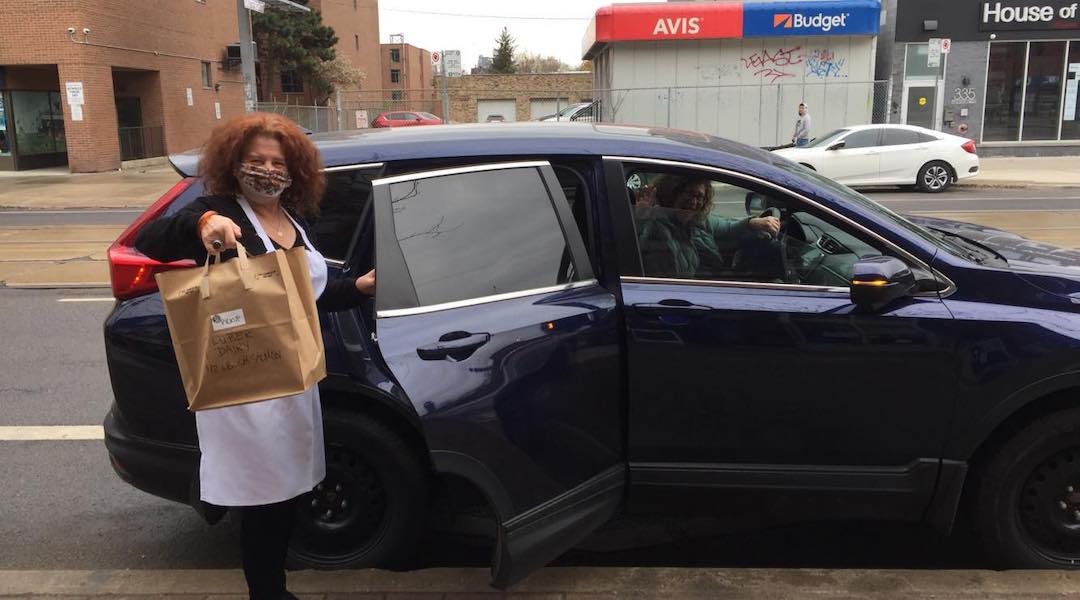
Judy Perly holds a takeout bag outside her Free Times Cafe. (Courtesy of Perly)
Judy Perly bought the Free Times Cafe, situated in the Little Italy neighborhood, 40 years ago as an alternative to life as a “starving artist.” Jewish food wasn’t the focus at first — that came 15 years later, around 1995, when the business needed a boost after a fire. Perly was living in her late mother’s house, near Bathurst and Eglington, where kosher bakeries like Grodzinski and Hermes appeared to be thriving.
“I didn’t have my own children. I want[ed] to be a Jewish mother,” Perly recalled.
Shortly thereafter, “Bella! Did Ya Eat?” was born — a weekly Sunday brunch buffet named after Perly’s mom, Bella, complete with live klezmer music. This helped cement Free Times as a local institution known for homemade Jewish, Middle Eastern and Canadian food accompanied by live entertainment seven days a week.
After closing in mid-March, Free Times Cafe sprang into action to create a Passover pop-up menu for pickup and delivery. Perly said it sold 600 meals in three days and had to turn away 200 more.
“It was so successful, it was too much for us,” she said.
Since then, Perly said her team has developed an improved online ordering system, allowing catering to continue without a hitch while the restaurant’s 110 seats rest empty. The takeout menus for “Bubie’s Friday Nite Dinner” and Mother’s Day brunch featured popular Free Times fare including chicken soup, brisket, blintzes, latkes, challah, bagels and fish platters.
The last “Bella! Did Ya Eat?” to take place in person was March 8, Perly’s 70th birthday. Nevertheless, Perly has found ways to bring the ambiance to customers’ homes. She’s used Facebook to broadcast live concerts and lead patrons in her famous “Sunday OYs!”
Appearing in a Facebook video, Perly is seen sitting alone in the empty restaurant.
“We’re gonna do six oys today,” she says, inviting viewers to join her. “Oy, oy vey, oy vey iz mir, oy a broch, oy gevalt and oy yayoy yayoy yayoy — and do we ever need [them].”
The Toronto Jewish Film Festival goes online
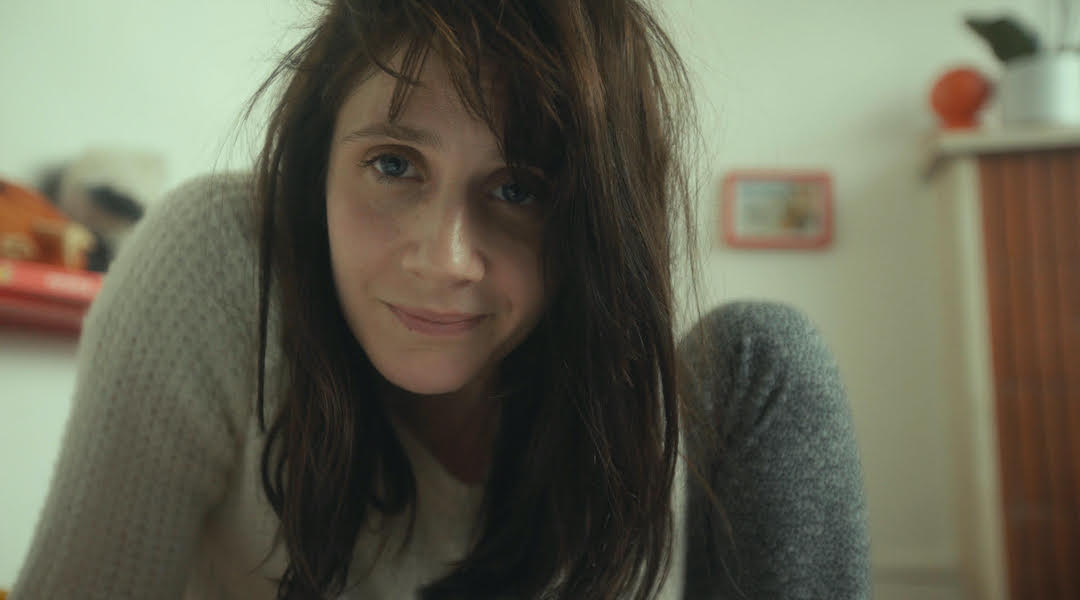
Actress Judith Chemla in a scene from “The End of Love,” which was set to open this year’s Toronto Jewish Film Festival. (TJFF)
Founded in 1993 as a response to the lack of Jewish content playing in mainstream cinemas, the Toronto Jewish Film Festival has grown to become Canada’s largest annual Jewish cultural event: an 11-day festival showcasing 100-plus films from more than 20 countries. They also run year-round programming, and J-Flix, a free streaming platform dedicated to Jewish and Israeli movies.
For the first time in its 28-year history, the festival — which begins May 30 — is set to take place online.
In a normal year, 20,000 people attend the festival. But “no one can describe this as a normal year,” said Debbie Werner, its executive director.
The festival is holding dates at the end of October for a tentative in-theater portion.
“Some of the films we show do get theatrical releases or make it onto major streaming platforms like Netflix, but a lot of them don’t … and if the work can’t be seen at festivals, it can’t be seen,” Werner said. “It’s really important for us to support the artists … as well as to encourage film as a medium where we explore Jewish culture and preserve Jewish history.”
This had been a record year of over 900 submissions, including Ron Chapman’s film “Shelter,” which was slated to premiere at the festival. Chapman said that after putting three years into his documentary on the ways that Jewish immigrants shaped Toronto, he has decided to hold off until it can premiere in the way he envisioned.
“I really felt that I made a film for the big screen, to be seen in a theater,” he said. “For me, it is worth the wait.”
Werner said the goal is to maintain the festival feel. Using an encrypted viewing platform built by CineSend, the festival intends to follow a set schedule, releasing each film for 24 hours, followed the next day by a Zoom Q&A with filmmakers and guest speakers.
The opening film, “The End of Love,” is expected to drum up discussion because of its timeliness: It’s an autobiographical story about a long-distance relationship unfolding entirely over Skype.
A bar and bat mitzvah photographer gets creative
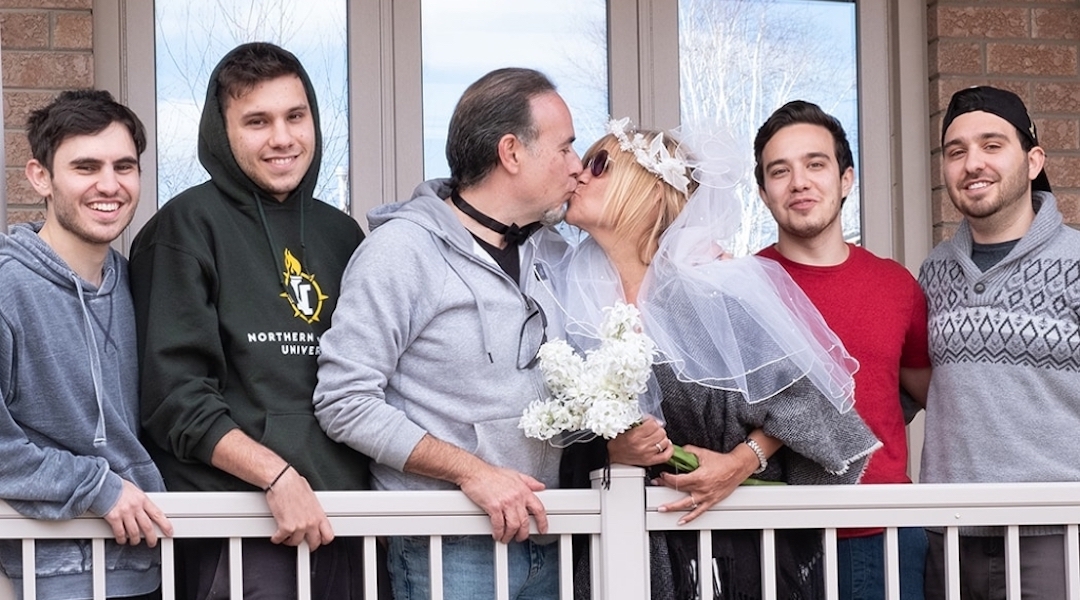
This photo of the Nemers family was taken as part of Elliot Sylman’s Porch Pics project. (Elliot Sylman)
Photographer Elliot Sylman, who specializes in weddings and bar and bat mitzvahs, has been busy for a man with no events to shoot. Last week he photographed 23 families in one day — mostly on their front porches.
Instead of charging $400 per portrait, his usual fee for this type of work, he’s asking customers to donate to Reena, a nonprofit that supports individuals with developmental disabilities within a framework of Jewish culture and values. He calls the initiative Porch Pics.
“There’s no sense in sitting around and not doing something. If you can’t work, you may as well deliver meals or try to raise money,” said Sylman, 53, who typically gets home in time for dinner with his wife and two daughters, then heads straight back to work processing the pictures. He picks his favorite and sends it to the subjects within a day, along with a link to donate.
Despite the Porch Pics moniker, some groups are photographed in cars or on driveways. Sylman uses a zoom lens to capture apartment dwellers on balconies. Some portraits are serious, others are kitschy — pajama-clad folks clutching cleaning supplies or martinis.
“It was nice to get the family together and just smile,” said Elana Gryfe, a teacher for the Toronto District School Board, who participated in Porch Pics with her husband and three kids ages 16, 19 and 22. Gryfe said she plans to frame the photo, which will serve as a snapshot of this “moment in time” — her son’s quarantine beard and all.
“And Elliot’s a really fun, nice person. So that social interaction was good even though he was six feet away,” she added.
Sylman, who’s been a photographer for 34 years, said Porch Pics quickly ballooned from a few friends to over 250 groups, and he has nearly surpassed his $18,000 fundraising goal.
He works with several charities throughout the year, and has photographed over 400 Holocaust survivors, which could be the largest collection of formal portraits of survivors in the world. He said he wants to publish a book soon and, if he can find a sponsor, hopes to photograph hundreds more survivors in Israel once international travel resumes.
Kavod-19: A Jewish Facebook group helps thousands
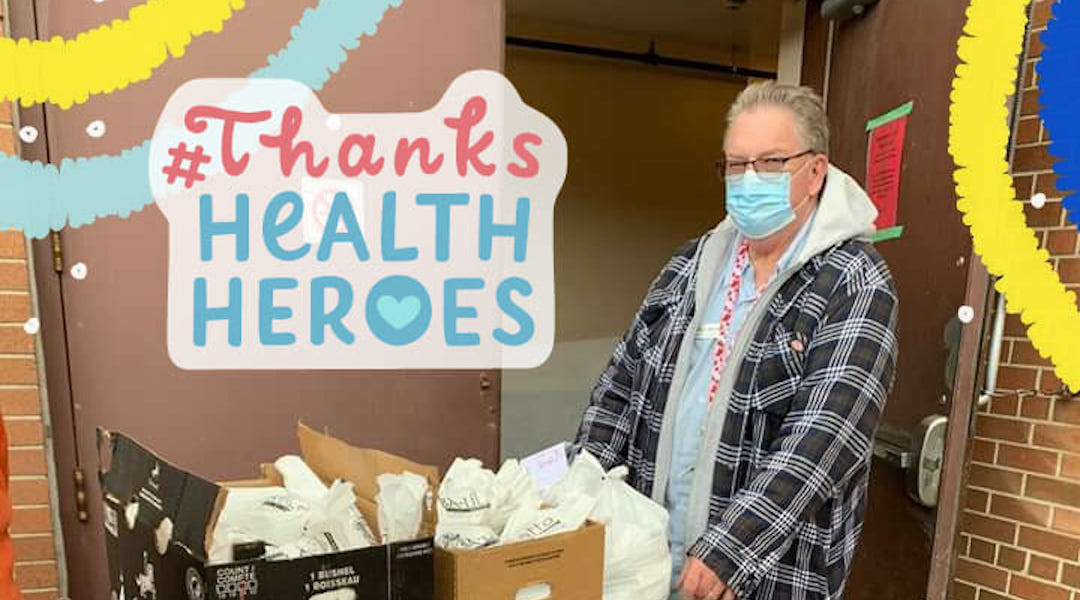
A restaurant employee pitches in for the Kavod-19 Facebook group, which coordinates bringing food donated from restaurants to front-line health care workers. (Klara Maidenberg)
Facebook has become a hub for Torontonians, connecting those who want to help with those who need it. But, as Zack Babins rapidly realized, “the Jewish community has certain needs that would go overlooked in a massive general group.”
In early March, before the mandatory lockdown, Babins became inspired by a Facebook group called CareMongering-TO, which aimed to share and organize resources. He came up with a pun and formed “Kavod-19: Toronto Jewish Community Response to COVID-19.” Kavod is the Hebrew word for honor and respect.
Babins, 27, said he hoped to hit 1,000 members the next week. He hit 1,000 the next day.
Since then, the group has been used for numerous purposes, such as helping people track down kosher food, socialize with isolated Holocaust survivors, donate supplies and access support systems. One post asks if anyone has a “free standing Chuppah to rent/borrow for a Zoom wedding.” There is a no-tolerance policy for bigotry, ads or disinformation.
Rafi Yablonsky, an administrator who assists with managing the group, said he gets messages daily from people asking how they can help. And Babins said the group has been keeping up his spirits. There are now over 9,000 members representing a cross-section of this city’s Jewish community.
“I invited mostly people in my peer group, which is like a secular Ashkenaz mid-20s range,” said Babins, who grew up in the highly Jewish suburb outside of Toronto called Thornhill, and whose long history of community involvement includes the Alpha Epsilon Pi fraternity and Hillel Ontario.
“But then you could see when people in the Russian community started getting invitations and people in the more observant community — it was very interesting watching that happen. … We came together in a really big way.”
Sock footage
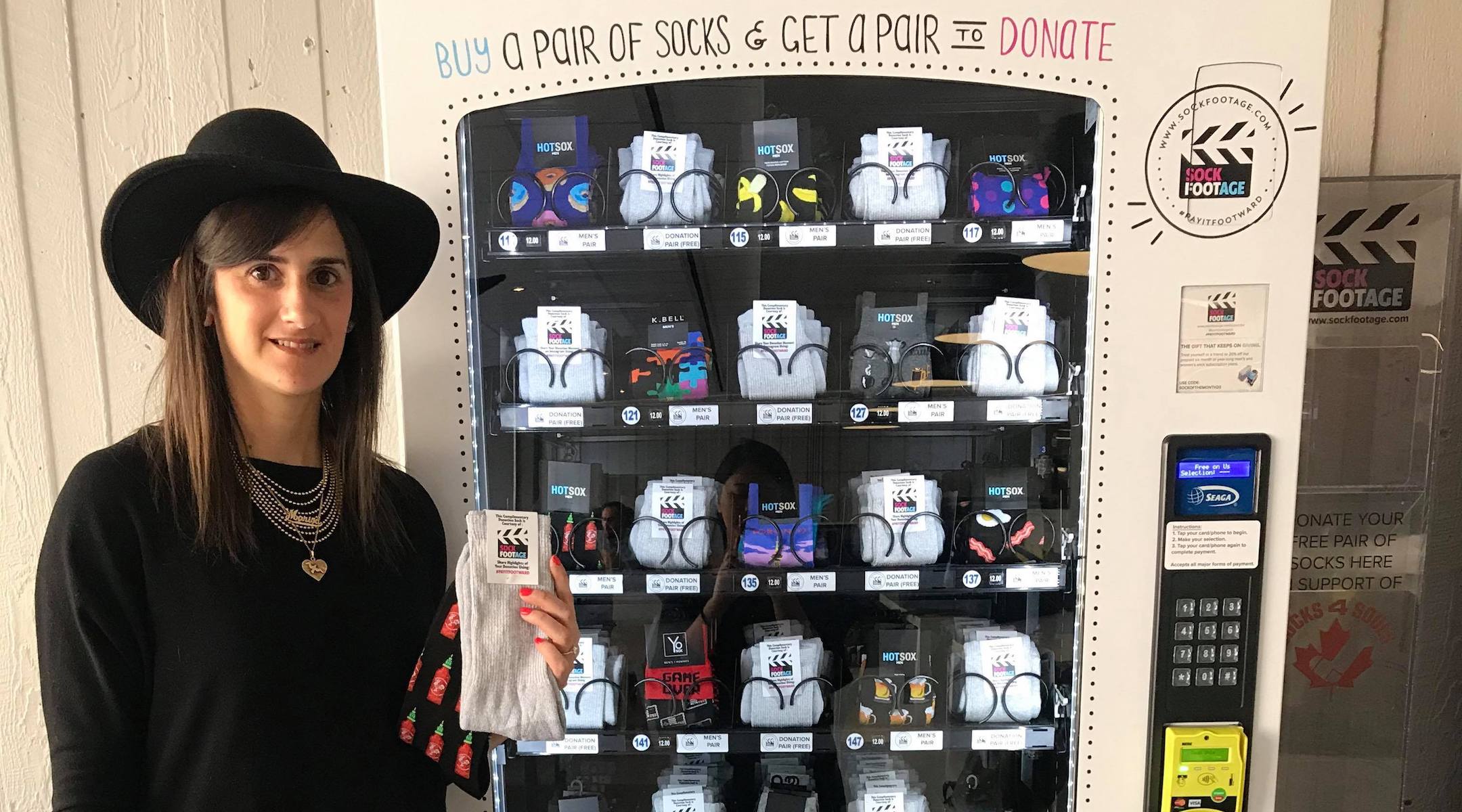
Marisa Sheff stands alongside one of her sock vending machines at Ryerson University. (Courtesy of Sheff)
Marisa Sheff offers a different way to donate. Every time someone purchases a pair of novelty socks (think Pac-Man or sriracha sauce graphics) from her company, Sock Footage, they donate a second pair of men’s cotton socks to someone in need.
This isn’t just a stroke of pandemic PR — it’s how her business operates. Sheff, 38, came up with the idea after learning that socks are the most needed but least donated item at homeless shelters.
In addition to its online store, Sock Footage has been piloting one of the first known charitable vending machines in Ryerson University’s Podium Building, which drops two pairs of socks for the price of one and has a donation receptacle beside it. Sheff’s socks have also served as philanthropic loot bags for birthday parties and bar and bat mitzvahs. Since launching, Sock Footage has donated almost 2,500 pairs of socks.
When the coronavirus hit, Sheff’s business stalled: The vending machine stood stagnant behind Ryerson’s closed doors, direct contact with strangers became unthinkable and her partner charity was no longer able to accommodate her donations.
Then she found out that Ve’ahavta, a Jewish humanitarian organization based in Toronto, was still operating its mobile outreach van. With new health and safety precautions, the van is servicing its route six days a week, handing out critical food and supplies to vulnerable people living on the streets. Among the supplies are Sheff’s socks.
Agencies estimate that street homelessness in Toronto has tripled due to social distancing in shelters resulting in fewer beds, and to justified fears of confined spaces. Ve’ahavta outreach worker Kelly Bouchard said he’s “met at least a handful of people who have recently lost their jobs” and wound up on the street.
“There’s a lot of people that are like, ‘What are socks gonna do?’ And I get that. But do something or do nothing,” said Sheff, who worked for a large sock manufacturer for five years before starting her own business. “I can’t change the world. I can only do what I’m good at.”
Digital davening
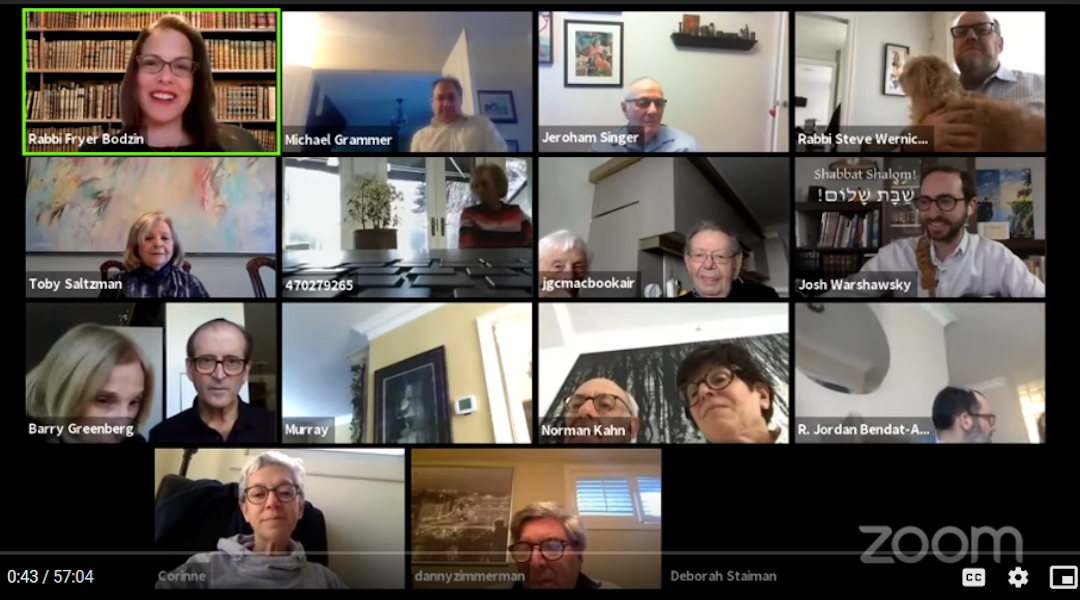
A screenshot from a recent Kabbalat Shabbat service held by the Beth Tzedec congregation. (Courtesy of Beth Tzedec)
Like everything else, prayer has gone digital. But in the true fashion of “two Jews, three opinions,” the city’s spiritual leaders have approached this in divergent ways.
Rabbi Yossi Sapirman has been using a PTZ HD camera to livestream Shabbat services from Beth Torah, a Conservative 500-member synagogue once known for having a waiting list.
“We want people to be passive, and enjoy and listen. Like in shul, they’re not obligated to think about what’s next. It’s just delivered,” Sapirman said. “I could’ve done a green screen and had a background and so on, but the idea that I could hold down the fort for everybody … it’s very powerful for the [congregants] to feel themselves in the space.”
On the flip side, Rabbi Elyse Goldstein of City Shul, a small Reform congregation located downtown, is strongly against livestreaming from a synagogue in this moment.
“I am role modeling the stay-at-home guidelines and I feel like even though I can walk to my synagogue and be the only one in the sanctuary, the minute I do that it’s not fair because I’m telling my congregants to stay home,” she said.
Goldstein has been leading Shabbat services from home over Zoom. She said her goal is to make the experience less passive: Viewers follow along on a screen, a “gabbai” is assigned to answer “amen” so there’s always an additional voice, and they use the breakout room feature after the kiddush and hamotzi to say “Good Shabbos.”
“We make a l’chaim and I bring my little scotch into every room,” she said.
Beth Tzedec, the largest Conservative synagogue in the world with its 5,000 members, is doing a combination of Zoom and broadcasts via Facebook and YouTube, depending on the service or program. Streaming on Shabbat and holidays is still under discussion on the basis of it being “sha’at hadehak,” a crisis situation, according to Rabbi Steven Wernick.
Moving online hasn’t been without challenges.
Shaarei Shomayim, a 90-year-old Modern Orthodox congregation, experienced a “Zoombombing” incident during its nightly prayers on April 19. Rabbi Chaim Strauchler said hackers shouted slurs and streamed pornography as he was about to recite a prayer for front-line workers.
“It was traumatic for everyone who was on the call,” Strauchler said.
Police are investigating the incident as a hate crime.
Since then, Shaarei Shomayim has heightened its cybersecurity, and Strauchler said many Canadians, including members of Parliament, have reached out with well wishes and support.
Participation has increased across the board at the city’s synagogues. Goldstein said that comes with apprehension.
“It’s terrific, but there’s a lot of surfing going on,” the rabbi said. “There are people who in September will say, ‘Why bother rejoining when I can go to all the big names in L.A. and New York for free online?’ … [The alternative:] ‘This is my community. This is my hometown. This is my rabbi, and I want to be there.’ What really is driving people to us? We need to start analyzing that.”














